We can't make our hands any bigger, so why do we keep supersizing our phones?
The Samsung Galaxy Z Flip is an eye-catching device with a lot of allure for your average enthusiast. Unfolded, it's got a nice big screen, a powerful processor and decent battery life, and folded up, it's palm-sized and quite fetching with its mirror finish.
To me, a simple gal with snug jeans, the Galaxy Z Flip is another hollow hope in the unending search for a reasonably sized smartphone. Yes, folded up, the Flip will fit in the front pockets on most of my pants — most, but not all — but it's still a phone with a lot of compromises that customers shouldn't have to make in their search for a reasonably-sized smartphone.
When I first came to the Android world in 2012 with the Samsung Captivate Glide, the phone easily fit in my front pocket, even with its thicker profile due to the slider QWERTY keyboard. In 2013, I upgraded to a equally pocket-friendly Moto X 2013, which was the phone so perfect it turned me into an Android nerd. It felt wonderful in my hand — I still remember that lovely divot — and I could use and type one-handed on it easily.
5.5-inch screens were once phablets. Now they're considered mini.
Of course, the problem is that screen sizes didn't stay in that range for long. From 2013-2017, phone sizes ballooned, and then they've slowly kept creeping up towards full-blown tablet sizes ever since. To a degree, this super-sizing has been mitigated by the quest for zero bezels, but in the last year, main flagships well and truly super-sized with the OnePlus 7 Pro and now the 6.9-inch Galaxy S20 Ultra.
It makes sense: bigger screens mean you can see more at once, and they're better for watching videos on. But those bigger screens need bigger batteries to power them, which makes them heavier and harder to hold, especially for teens and women like myself who don't have basketball-palming hands. Using a phone grip is now a necessity for me, not just because I've utterly wrecked my pink propping up these huge phones in my hands while I type, but because it's the only way to comfortably grip a phone with a 6-inch screen or larger.
We know that phonemakers see our longing for a smaller phone. The iPhone SE answered a lot of prayers and the rumor mill churns constantly with the hopes that a sequel is in the works. The Samsung Galaxy S10e was a practical, compact flagship that captured the hearts of many last year for avoiding the buggy ultra-sonic fingerprint sensor and shatter-prone waterfall display.
Smaller screens feel like downgrades, even when they shouldn't.
The S10e did not see a successor in the Galaxy S20 line, and it's taken years and years to see a replacement for the iPhone SE because while they have a devoted following, smaller devices are a hard sell in the flagship space. Unless a smaller footprint is your primary goal, it's exceedingly difficult to go back to a smaller screen.
We see it as a downgrade: our review called the 5.8-inch screen on the S10e "cramped" and I know just how easy it is to get used to these monster screen sizes. When I went from the Note 10+ to the Pixel 4, it felt small for a couple days, but the ability to actually use my phone one-handed again was enough of a godsend that it was worth having to scroll more often while reading articles and Reddit.
I know "the perfect phone" is impossible, but I think we've reached the point where the "the perfect petite phone" is more than possible in 2020. While the quest for 5G and 4K supersize screens and batteries, smartphone makers could make a tidy profit counter-programming with a flagship that will fit easily in smaller hands and women's pockets: a 5.3-inch 1440p screen with small bezels, two-day battery life, dependable Bluetooth and good primary and ultra-wide cameras. Give it Android 10, at least 6 GB of RAM and three years of updates, then take my money.
Petite pick
Google Pixel 3a
A solid phone for smaller hands and pockets
The Pixel 3a has much of the camera and feature performance as the Pixel 3 (or Pixel 4) for hundreds less, and it offers up a 5.6-inch screen instead of all these six to seven-inch monsters. It's also a phone that you can actually use one-handed and fit in the front pocket on some women's jeans.



Tidak ada komentar:
Posting Komentar